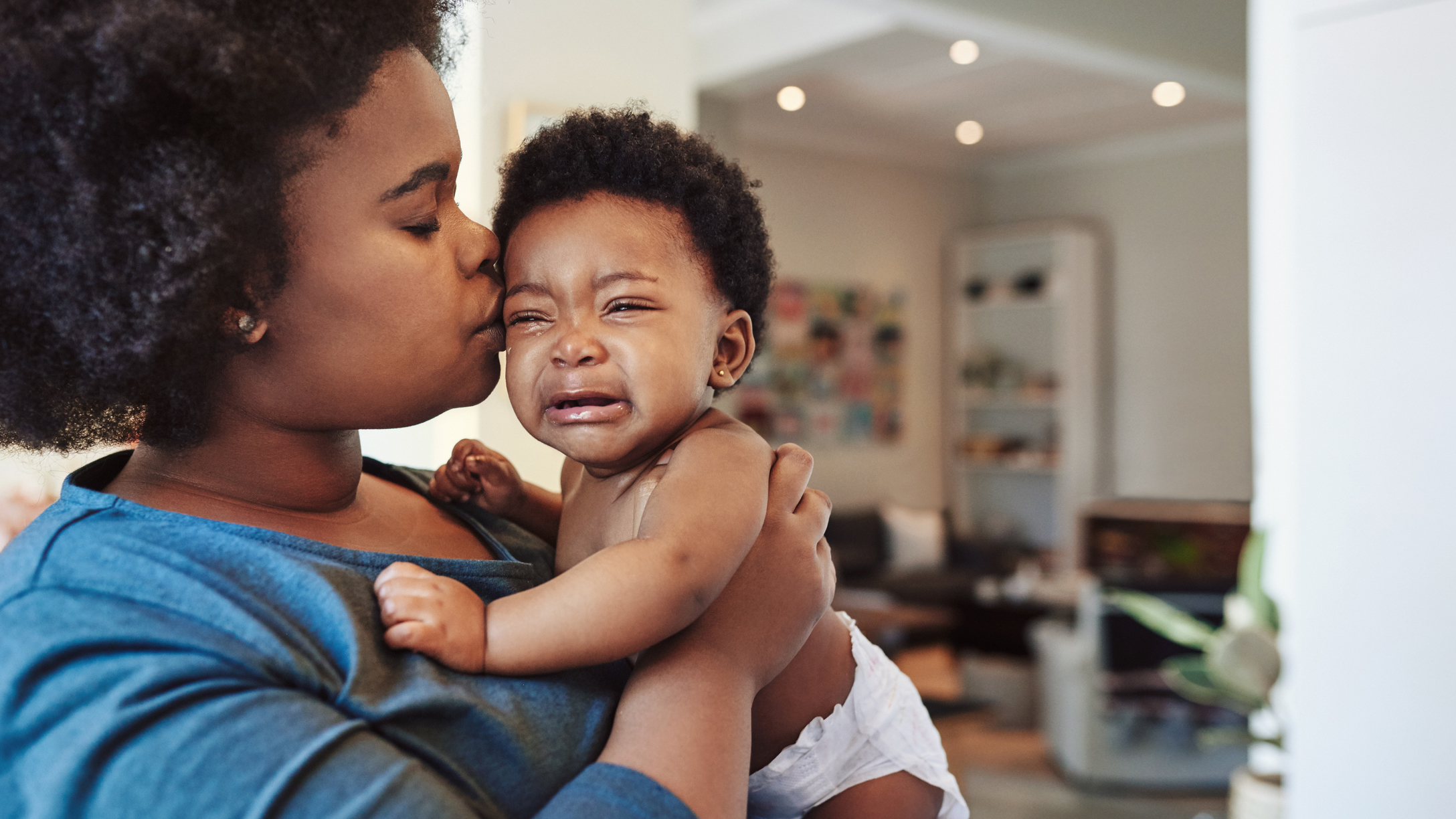
In this article
When you’re a new parent, all you’re trying to do is keep your baby happy and healthy. Since babies can’t talk, the only real barometer you have to figure out if they’re happy is if your baby is crying or not. But what happens when your newborn wont stop crying and you can’t do anything to soothe them? If you’re finding that your baby’s crying is pushing you to the brink, here are some tips for you to keep your cool when your baby can’t.
Why babies cry

First off, please know it’s totally normal for babies to cry. Generally, your pre-verbal baby might cry if they are:
- Hungry
- Have a wet or dirty diaper
- Tired
- Gassy
- Overstimulated
- Bored
- Too hot or cold
- Want to be held
However, sometimes your child might keep fussing because they may have colic, which is when an otherwise healthy infant will not stop crying for long periods of time.
“They may be extremely fussy, unable to calm down, and also be very gassy. Most of the time, it means babies are very sensitive to stimulation and have trouble self-soothing,” pediatrician Steph Lee, MD, MPH, FAAP told Mom.com.
“My oldest cried a lot when he was an infant. If he was already fed and clean and being held, it was hard to figure out what would help,” mom of four Amy H. told us. “I found that putting him in a front carrier and running the vacuum cleaner, or putting on white noise and using the baby swing, or going out for a ride in the car often helped. Sometimes nothing helped.”
While relatively common in infants, it is usually outgrown around 3 to 4 months. Dr. Lee added that in breastfed babies, sometimes this can be a sign of sensitivity to certain foods in the breastfeeding parent’s diet.
“Signs to watch out for is if your baby is refusing to feed for hours because of crying, has a fever, diarrhea or constipation, or won’t calm down even after several hours,” cautioned Dr. Lee. “If you think it’s more than just colic, see your pediatrician to make sure nothing more serious is happening.”
How to calm anxiety when your baby keeps crying

While wailing babies are completely normal it can be very distressing for many parents, particularly when their child seems to be inconsolable. Here are some ways to soothe yourself when it feels as if nothing will soothe your baby.
Breathing exercises
This may sound cliché but take deep breaths. There are a variety of breathing exercises to help regulate your sympathetic and parasympathetic nervous systems. Here’s one method you can try called Box Breathing:
- Exhale for a 4-count
- Hold for a 4-count
- Inhale for a 4-count
- Hold for a 4-count
- Exhale for another cycle
Practice self-care
While self-care may look like getting a manicure or a night out with friends, it can also look like:
- Taking a long shower
- Taking a nap
- Sitting down to eat while the meal is still hot
- Watching an episode of your favorite K-drama
- Asking for help
- Giving yourself grace
- Listening to a podcast
All of these suggestions may sound like a pipe dream, but getting someone to help you and hold your baby for an hour while you try and do one or two things, can make you feel like a human again.
Take a timeout
Sometimes, all you need is a quick moment to yourself to reset your equilibrium. While you may feel like a bad parent for letting your baby cry by themselves for 10 to 15 minutes, your sanity is important, too. Set your infant in a safe place like a crib, close the door, maybe put in earplugs, call a friend, listen to your favorite playlist, or go through some deep stretches.
“I decided that both of us taking a short break from each other would be far preferable to me getting resentful or losing my temper with a baby who couldn’t help acting like a baby,” explained Amy H, saying she would put her son in his crib and let him cry for a bit on his own. “Sometimes he would fall asleep. Sometimes I would just put on earphones and have a cup of tea, take a deep breath, and then go back to pick him up and start the whole try-to-calm-a-baby cycle over again.”
Exercise
Not only can exercise keep your body physically healthy, it releases feel-good chemicals in your brain like endorphins and dopamine. While you may no longer have time for a full hour class at your gym, you might be able to squeeze in a free 15-minute YouTube yoga session or go on a walk with your baby.
Connect with friends
Have a support system of friends who are either fellow parents, or friends who are good listeners and tell great stories to distract you! Whatever kind of companion, it’s easier to bear a burden when you have a squad to back you up.
Struggling to calm yourself? When to seek help

Of course, there will also be times and situations where nothing you do works and you feel anxious all the time. Please seek professional help if you’re having trouble coping with your baby crying nonstop. You may have postpartum depression or just need a neutral third party to support your feelings about being a parent. There is no shame in knowing when you need help and reaching out.
“Moms are suffering from so much more anxiety than we have seen in the past in the mental health field,” social worker Lauren Peabody previously told Mom.com. “Moms feel like they are not good enough and need to do more, be more.”




